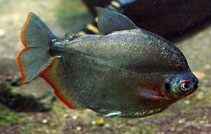| Family: |
Serrasalmidae (Piranhas and pacus), subfamily: Colossomatinae |
| Max. size: |
25 cm SL (male/unsexed); max.weight: 1,000.0 g |
| Environment: |
benthopelagic; freshwater; pH range: 5 - 7.80000019073486; dH range: 20, potamodromous |
| Distribution: |
South America: rio Paraguai, lower Paraná and lower Uruguai rivers basins. |
| Diagnosis: |
Vertebrae: 35-36. This species differs from M. aureum by having the last abdominal spine reaching the anal-fin origin or almost so (vs. last abdominal spine clearly separated from the anal-fin origin), vertebrae 35-36 (vs. 38-39), and a conspicuous black blotch on opercle (vs. no black blotch or inconspicuous); differs from M. albiscopum by anal-fin with branched rays 26-32 (vs. 31-38); differs from M. unimaculatum by having circumpeduncular scales 30-34 (vs. 34-40), perforated scales on lateral line 74-98 (vs. 95-110) and vertebrae 35-36 (vs. 37) (Ref. 117280). |
| Biology: |
Reported to be an herbivore fish, which is highly dependent from the floodplains and of great economic importance for both commercial and sport fisheries (Ref. 117280). |
| IUCN Red List Status: |
Least Concern (LC); Date assessed: 21 December 2020 Ref. (130435)
|
| Threat to humans: |
harmless |
Source and more info: www.fishbase.org. For personal, classroom, and other internal use only. Not for publication.
